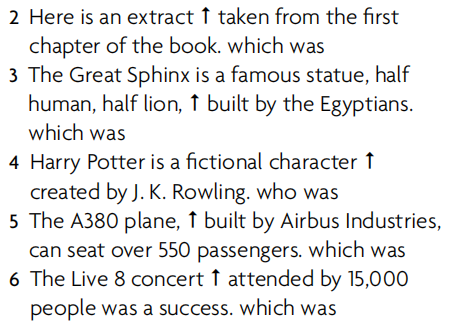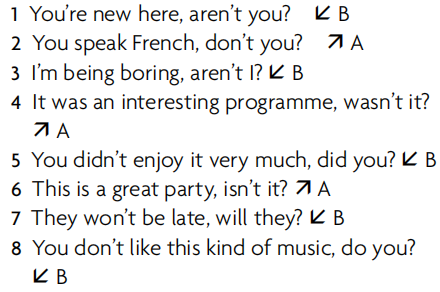10.Using fame to help(十单元)
1.a: 2 ✓ 3 ✓ 4 ✓ 5 ✗ 6 ✗ 7 ✓
b:

2.a:2 c 3 a 4 c 5 b 6 a
b: 2 sensation 3 household 4 made 5 made 6 enjoyed
3. a: 2 thought 3 way 4 concerned 5 mind 6 ask
b and c: 2 I couldn’t care less. Ø 3 It doesn’t really matter. Ø 4 It’s not a good idea. ✗
5 I’m completely against it. ✗ 6 It can’t be a bad thing. ✓
d: 2 express 3 considered 4 difference 5 second 6 high 7 poll 8 public
4. a: 3 ✗ are you? 4 ✗ doesn’t she? 5 ✗ didn’t he? 6 ✓ 7 ✗ did it? 8 ✗ didn’t they? 9 ✓ 10 ✓
b: 2 isn’t it 3 have they 4 does she 5 won’t she 6 didn’t they 7 shouldn’t we 8 could they
c: Harry: Did you see the programme about celebrity charity work last night?
Carol: Yes, it was interesting, wasn’t it?
Harry: Not really. It didn’t tell you much you didn’t already know, did it?
Carol: What do you mean?
Harry: I mean, we know everything there is to know about Brad Pitt, don’t we? People don’t want to see his face on TV again, do they?
Carol: Oh Harry – you can be really boring sometimes.
Harry: Sorry, but you asked me what I thought.
Carol: Well, yes – but if you always talk like that, people won’t ask you for your opinion very often, will they?
Harry: OK, I’m sorry. Let’s talk about something else. I mean, we shouldn’t fall out over something as silly as this.
Carol: But Harry, you don’t really think charity work’s silly, do you?
2 did it 3 don’t we 4 do they 5 will they 6 do you
5. a:

6. a: 2 We might as well. 3 What do you reckon? 4 Leave it out 5 I couldn’t care less.
6 I thought as much.
b:b 4 c 2 d 1 e 5 f 6
c:1 I couldn’t care less 2 I bet 3 What do you reckon? 4 Leave it out 5 I thought as
much 6 we might as well
7. a: Interviewer: First of all, can you tell me, erm … what is it that qualifies someone to represent UNICEF?
Expert: Well, UNICEF’s celebrities have a wide range of talents and achievements, you know – there are singers, writers, actors, musicians, erm, footballers of course, erm, photographers – all kinds of people. But they all share a commitment, erm, a commitment to improving the lives of children all over the world.
Interviewer: I see. And how does UNICEF pick the people to be ambassadors?
Expert: Well, in each case a celebrity working with UNICEF happens because he or she has already … erm … shown some commitment. For example, Youssou N’Dour, the singer from Senegal, erm, he became a Goodwill Ambassador in 1991 but before that, in 1987 I think, he had already worked on a programme in his own country to
immunise children, you know, protect them from diseases. And he’d also, if I’m not wrong, he also took part in concerts to raise money for kids in Africa.
Interviewer: Uh huh.
Expert: And Shakira, the Colombian singer, had also done a lot of work and shown a lot of interest in children, especially education for children, before she became an ambassador in, erm, in 2003.
Interviewer: Right. And, it’s always important that they’re famous, isn’t it? I mean, you always ask famous people to become ambassadors.
Expert: That’s right. But they don’t need to be famous worldwide. I mean, there are many ambassadors who are best known in the parts of the world where they are going to work, and that’s extremely useful. Erm, but the important thing, you see, the really important thing is that celebrities do two things. That they attract attention, when they travel and visit places, there are cameras behind them and in front of them because they’re so well-known. And so the needs of children and the work of UNICEF get publicity, people know about it, this is very important …
Interviewer: And the second thing?
Expert: Well, the second thing is access – I mean, very often the fact that these people are famous means that they get access to presidents and prime ministers. These are the kinds of people who make the big decisions, who make changes. And the ambassadors can talk to them, and, you know, maybe the ambassadors can have some
influence. They can argue for children, they can argue for children’s rights.
Interviewer: Uh huh.
Expert: And that’s important, I mean, don’t forget that children can’t vote, they don’t get to choose the leaders of the country. So it can be easy sometimes for leaders, erm, politicians to, erm, not to pay much attention to children.
Interviewer: Yes, indeed. And what is it that UNICEF wants children to have?
Expert: Four things, basically – health, education, equality, protection. UNICEF believes that all children all over the world have the right to these four things, but in so many places they don’t get it. UNICEF wants to improve that situation and the ambassadors work to achieve that.
Interviewer: Is this a new idea, this idea of Goodwill Ambassadors?
Expert: Not really – erm, the first person to do it was Danny Kaye …
Interviewer: The film star in the 1950s?
Expert: Yes, he became ‘Ambassador at Large’ in 1954, so he started everything. And then later the great Audrey Hepburn, the film actress, she took the role on, and she was incredible, she worked so hard, all the years up to when she died in 1993.
Interviewer: And there have been many other famous people too, haven’t there?
Expert: Oh, yes, the list is a very long one …
1 F 2 F 3 F 4 T 5 F 6 T 7 T 8 T
b: (possible answers)
1 They all share a commitment to improving the lives of children.
2 He took part in concerts to raise money for African children.
3 They can have some influence and argue for children’s rights.
4 Because children don’t have votes.
Unit check
1.2 borrowed 3 won’t 4 make 5 see 6 household 7 bad 8 enjoying 9 will 10 concerned
2. 2 a 3 c 4c 5 c 6 a 7 b 8 c 9 b
3. 2 made a name for himself 3 had a difference of opinion 4 get a second opinion 5 The way I see it6 have a high opinion of himself 7 He’s a household name. 8 was big
9 enjoyed a lot of success
